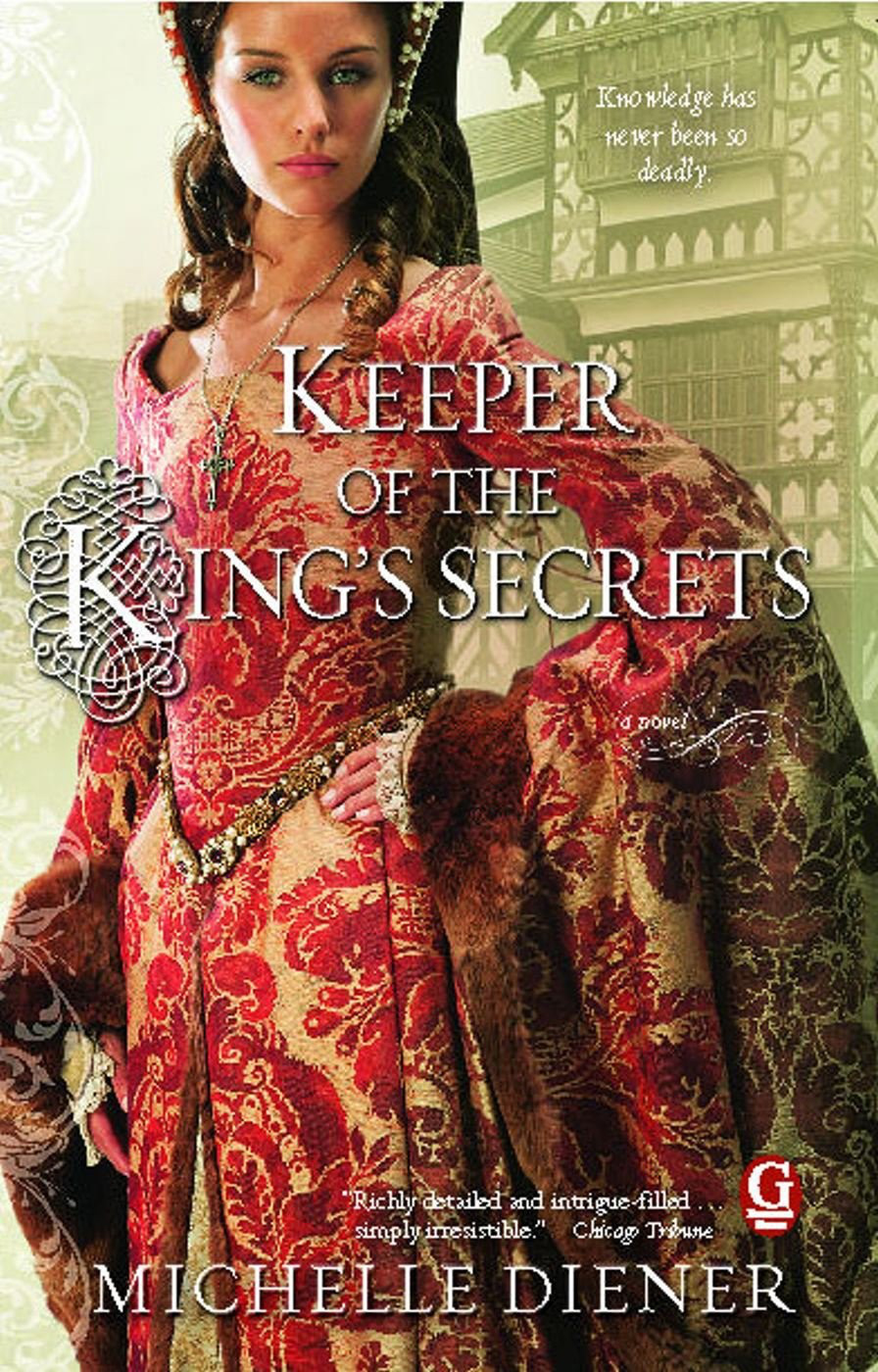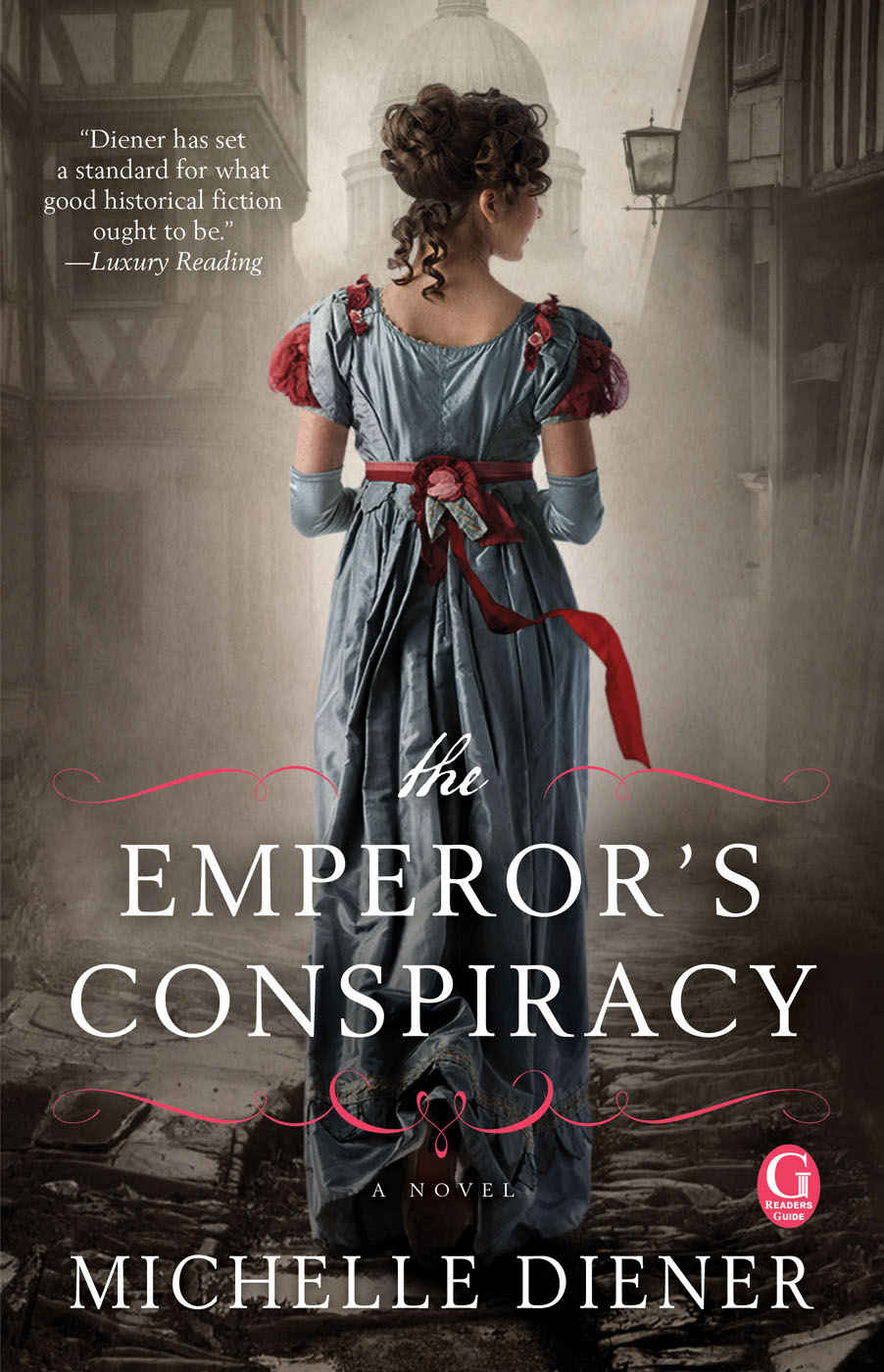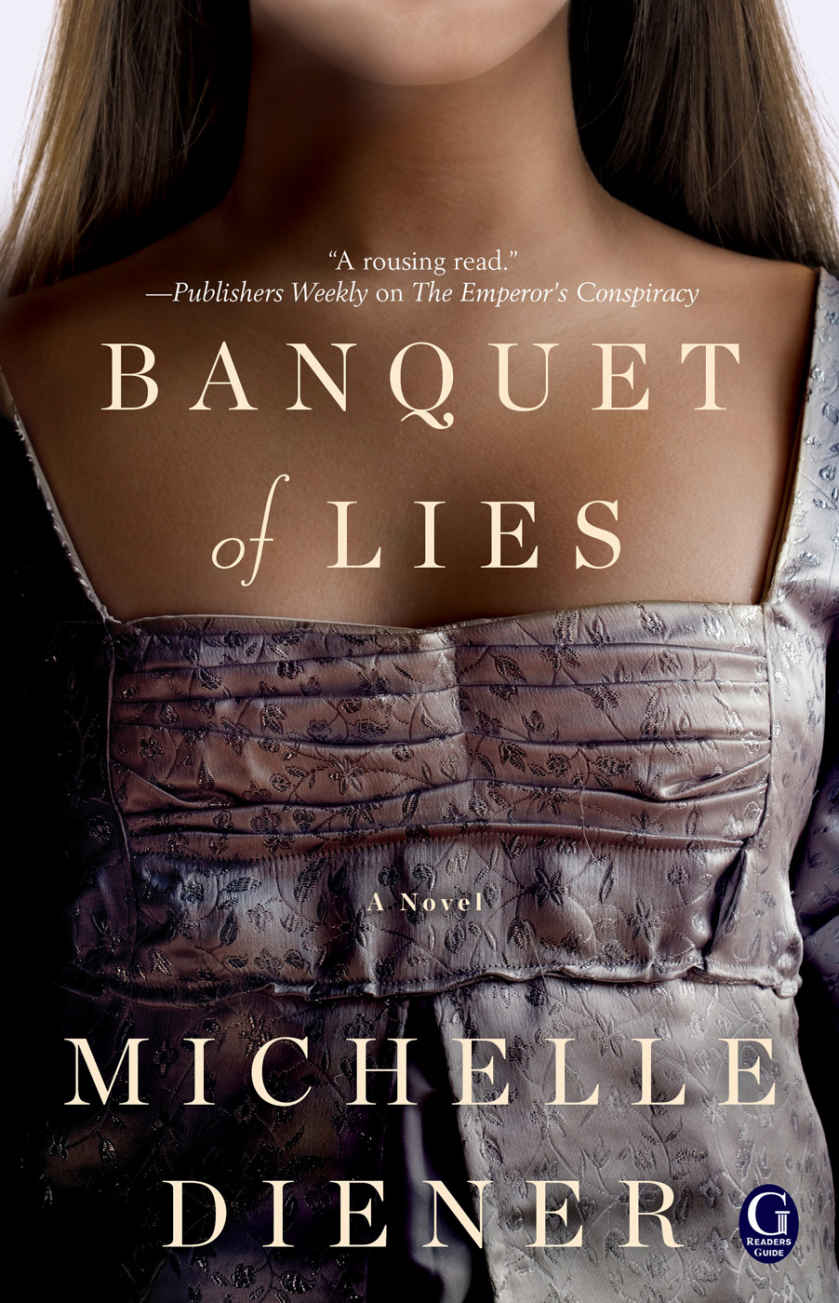Michelle Diener
Books: Romance | Mystery | Historical
Regency London: The Emperor's Conspiracy (2012), Banquet of Lies (2013), A Dangerous Madness (2014)
Susanna Horenbout and John Parker: In a Treacherous Court (2011), Dangerous Sanctuary (2012), Keeper of the King's Secrets (2012)
Susanna Horenbout and John Parker
In a Treacherous Court (2011)
London was a cesspit of mud and filth.
Susanna Horenbout is a Flemish painter sent by her father to the court of King Henry VIII to be his illuminator. But when she is the witness to the death of a man with a message to be given only to King Henry, her life is suddenly in grave danger.
Her parents thought she'd given everything up for lust. But she hadn't. She'd gambled her father would allow her the same freedom he did Lucas. Afford her the same respect. But she had lost.
Her chances of marriage were slim if she continued as an artist, and she had no plans to become a nun. She thought of Joost, and shivered. But her father had not placed her … explorations with Joost in the same category as Lucas's affairs. Instead, he'd shipped her off to England.
John Parker is what would later be called a made-man. He is a trusted courtier of King Henry, and sent to retrieve a shipment of crossbows, but ends up escorting the unexpectedly female painter sent to King Henry.
She watched him for a long moment. "What were you before you became the King's man, Master Parker?"
He felt himself sink into the green-brown of her eyes, calm and serene as a wood in spring. She could see straight to his soul. He did not know whether he should rejoice at that, or despair.
He led them through the door out into the freezing rain. "I was nothing."
The most fascinating part about this story is that these were real individuals about whom little is known other than their bare biographies–Susanna was an illuminator for King Henry and John Parker was a trusted courtier, and they eventually married. Since so little was known about them, the author got to make up how they met and fell in love.
The mystery was created for the story, but the elements were based on historical facts (even if the details are created whole cloth).
The constraints upon women were different than they were in the Regency and Victorian era, and although it was unexpected, Susanna was not rejected once she displayed her talent (something that seems unlikely in later eras).
"If I hadn't seen yer there with me own eyes, painting it, I'd never believe 'twas a woman done it."
The landlord meant it as praise, but suddenly exhausted, drained of all energy, Susanna was not able to summon even a weak smile at the insult.
Something I quite enjoyed about the story was that each chapter opens with–in essense–an etiquette lesson for men and women of the court.
The Chiefe Conditions and Qualities in a Courtier: To consider whom he doth taunt and where: for he ought not to mocke poore seelie soules, nor men of authoritie, nor commune ribaldes and persons given to mischeef, which deserve punishment.
Of the Chief Conditions and Qualityes in a Waytyng Gentylwoman: Not to speake woordes of dishonestye and baudrye to showe her self pleasant, free and a good felowe.
The Chiefe Conditions and Qualities in a Courtier: To speake alwaies of matters likely, least he be counted a lyer in reporting of wonders and straunge miracles.
Those are rather marvelous.
I have to say that despite the boinking, I quite enjoyed the story.
Published by Gallery Books
- March 2016 | Rating: 8/10
- April 2022 | Rating: 8/10
Dangerous Sanctuary (2012)
This novella occurs after the book In a Treacherous Court.
King Henry VIII is celebrating the defeat of Francis I of France and his English ally(ies), and Susanna Horenbout has been commissioned to paint the ceremony in St. Paul's Cathedral, but not all those who allied themselves with Francis were dealt with, and Susanna overhears what may be a plot to harm the king.
I really like these historical mysteries, especially as they are based on characters who really existed (even if the characters didn't actually solve mysteries), and I especially like the details–the past is frequently romanticized, when in reality for most people it was smelly and unpleasant.
Know that this is a short story–not a novel, and that this series is pretty expensive.
Published by Pocket Star
April 2016 | Rating: 7/10
Keeper of the King's Secrets (2012)
Susanna Horenbout and John Parker believe that things have settled down, now that the king has agreed to allow them to marry, however, intrigue spawns in the court of Henry the VIII, and Susanna's life is one again in danger.
Parker knew the King did nothing to stop the vicious rivalry in his court, thinking it provided him with a self-sustaining system of checks and balances, but sometimes the bitterness between the power factions was not to his advantage.
The Mirror–originally belonging to the French–has disappeared, and one of Susanna's countrymen seems to be involved in the theft.
The bits starting the chapters this time are Machiavelli's, the Prince, and are somewhat horrifying to me (no, I managed to avoid reading The Prince in school).
(M)en ought either to be well treated or crushed, because they can avenge themselves of lighter injuries, of more serious ones they cannot;
As with the previous book, I enjoy both the bits about illumination, and the bits about London, which was horribly dirty and dangerous.
Published by Gallery Books
March 2016 | Rating: 7.5/10
The Emperor's Conspiracy (2012)
Charlotte was saved from the Rookeries by Lady Howe, and has been debuted has her ward, but Charlotte has never forgotten her past, and maintains friendships and ties with those in the slums–although she does everything she can to pull others out of the poverty she escaped, with many of her old companions becoming servants for her and Lady Howe.
Initially, I had difficulty with the premise that not only would Lady Howe have saved Charlotte, but that she would also have allowed her to maintain her ties to the criminals of the past.
He touched his jacket, and she noticed for the first time that he was dressed like a delivery boy. He never dressed as well as he could afford to, but he never pretended to be something he wasn't. He caught her stare and shrugged.
"Didn't want the watchers to suspect me. So I delivered some vegetables to the kitchen. They'll think I've stopped for a cuppa and a chat."
But once I let that go, I found I did enjoy the story. (I read another book set in this time period by this author awhile ago, and quite enjoyed it, so I decided to pick up this earlier work.)
And I decided that Lady Howe was just a kind woman who allowed Charlotte to develop her own kindness.
Despite herself, she smiled.
"Stop that." Catherine drew her farther away from the dance floor.
"Stop what?"
"That pitying way you have of looking at me, when you think I'm being foolish in protecting you. You deserve the same respect and protection as every other woman here. Never forget that."
Edward never liked his sister's husband, and so when Emma shows up on his doorstep (after Charlotte saves her from her husband's disastrous dealings) Emma is uncertain of her reception, and so Charlotte offers to take Emma and her boys in.
I liked that Edward quickly realized he was a jerk, and apologized–to everyone. I also liked the Lady Howe was not inclined to trust him.
"I seem to have caused a stir last night at Lady Crowder's ball. And my name is being linked to Miss Raven's—"
"That isn't her fault." Catherine drew herself up, as if ready for battle.
"It is mine, and mine alone." He spoke calmly.
I also liked that the mystery had a basis in historical fact–that Napoleon wanted to bring down the British economy. Amusing and fascinating.
Characters: Charlotte Raven, Lord Edward Durnham, Lady Catherine Howe, Lady Emma Holliday, James Holliday, Ned Holliday, Harry Holliday, Geoffrey Holliday, Luke Bracken, Gary, Kit, Smithy, Peter, Bill Jenkins, Betsy, Jess Blackwell, Flo Jump, Sammy Bayton, John Norris, Dervish, Gerald Hawthorne, Clavers, Lord Frethers, Lord Tavenam, Lord Aldridge, Mr. Ashcroft, Ted Harkness, Blackley
Cover by Lisa Litwack
Publisher: Gallery Books
- August 2015 | Rating: 7/10
- August 2017 | Rating: 8.5/10
- February 2019 | Rating: 8/10
- March 2020 | Rating: 8.5/10
- March 2021 | Rating: 8.5/10
- April 2022 | Rating: 8.5/10
- March 2023 | Rating 8.5/10
- May 2024 | Rating: 8.5/10
- April 2025 | Rating: 8.5/10
Banquet of Lies (2013)
Giselle Barrington is the daughter of a folklorist with a fascination for cooking.
"What do you do with the recipes?" The woman looked genuinely interested now.
"I'm compiling a reference work of dishes from the cultures of Europe. But mainly I follow them."
"Follow them . . ." Confused, the woman looked around the crowded room, as if the people swirling around them could help her. "How?"
Gigi smiled. "The usual way. In the kitchen."
"You make the dishes?" The woman tapped Gigi on the arm with her fan. "With the servants?" Her voice was a squeak.
"With the chef who has accompanied us for the last ten years."
"Ah."
Her father is a noble with a fascination for folklore, so as he travels collecting folk stories, he often carries secret messages for the crown.
She had a strange sense, as they helped her along, that her plight was like that of a girl in one of the folktales her father collected.
When Gigi witnesses the murder of her father by and Englishman, she knows that the message she was holding for him is terribly important, and she needs to get it back to England to pass on the message, but she has no idea who she can trust with the message.
Lord Aldridge inherited his position upon the death of both his father and his older brother, so after being called back from the war, he does occasional work for the Foreign Office. He is also a neighbor of Sir Barrington, and has been looking for a French Chef.
This book was damn near perfect for me. It's got cooking, folklore, and a fascinating mystery.
I'm not quite sure how I managed to pick two books in a row where the heroines were cooks, but it caused me to spend the past two days constantly wanting to get up and go into the kitchen, and then remembering I have no brioche or gallettes.
Sadly.
The mystery was extremely well done. Giselle held the documents for her father, but knew absolutely nothing of his business with the Crown, and truly had no idea who she could trust, other than the chefs she grew up with, and so it was both logical and reasonable for her to hide in the kitchen as a chef.
She's a smart woman, and it's bad luck that keeps her from quickly finding someone to whom she can deliver the message (as well as the machinations of the man who murdered her father).
Something else I appreciated is that the butler–a man insecure in his position–causes her a great deal of trouble, but he isn't an evil man.
Edgars had tried to belittle her, as if doing so would somehow lift him up. And no matter how much she needed the safety and anonymity of Aldridge House, she could not accept that.
I really liked this book, and even though it is the second book in the series, you can easily read it without having read the first book (since the characters from the first book barely appear in this book).
Characters: Giselle Barrington, Lord Jonathan Aldridge, Sir Edward Thornton, Sir Eric Barrington, Barbara, Iris, Edgars, Mavis, Harry, Rob, Georges Bisset, Mr. Jones, Mary Jones, Mr. Greenway, Adèle Barrington, Captain Reginald Harriford, Daniel Dervish, Charlotte Durnham, Lord Edward Durnham, Lady Catherine Howe, Lady Emma Holliday, The Duke of Wittaker, Frobisher, Mr. Rice, Mr. Unwin, Mrs Thakery, Mrs. Lambert, Gilbert, Peterson, Gertrude, Violet, Bess, Henry Ingleton
Cover design by Laywan Kwan
Published by Gallery Books
- March 2016 | Rating: 9/10
- August 2017 | Rating: 9.5/10
- February 2019 | Rating: 9.5/10
- March 2020 | Rating: 9/10
- March 2021 | Rating: 9.5/10
- April 2022 | Rating: 9.5/10
- March 2023 | Rating: 9.5/10
- May 2024 | Rating: 9.5/10
- April 2025 | Rating: 10/10
A Dangerous Madness (2014)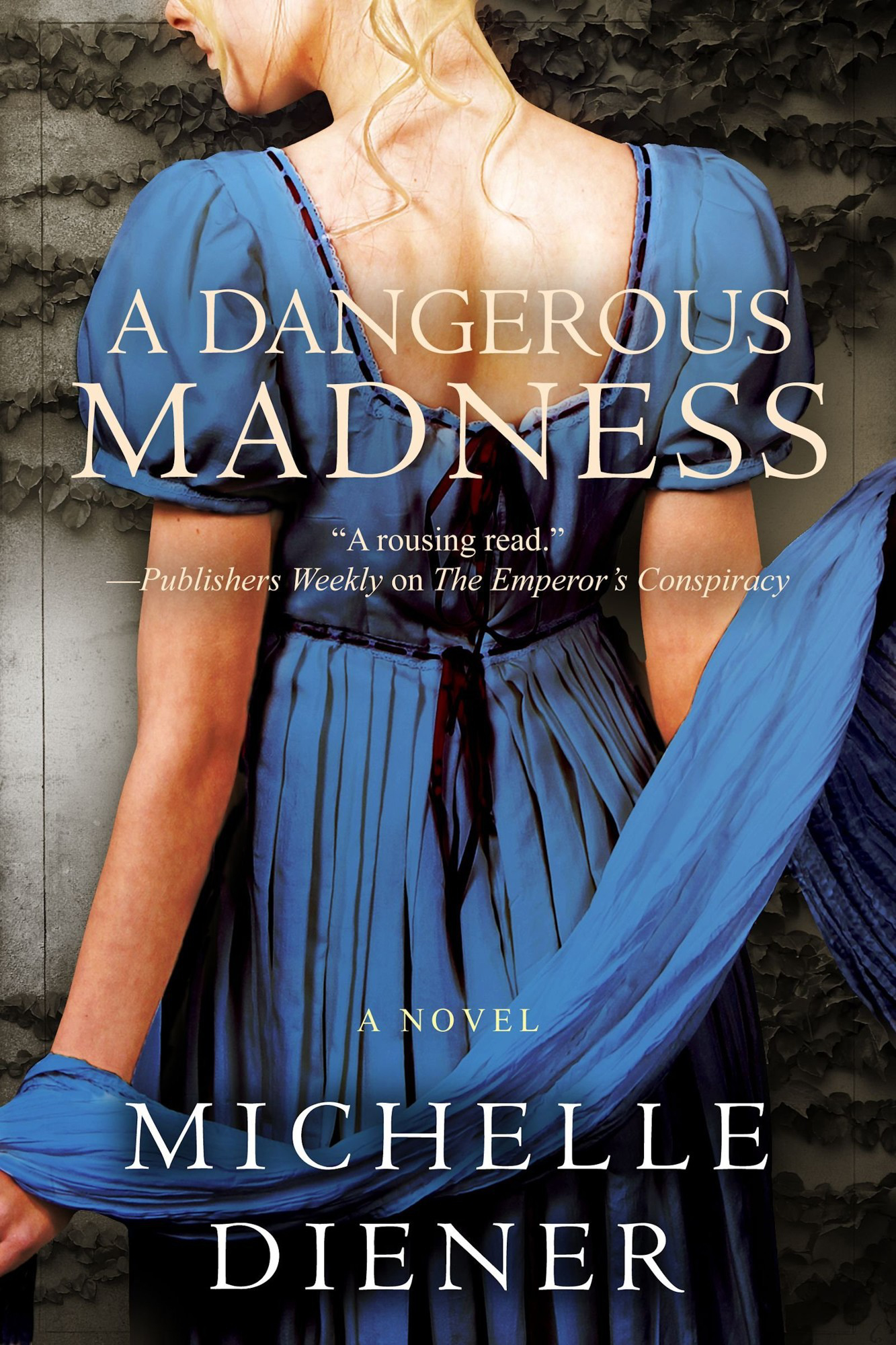
Set in London in 1812.
Phoebe Hillier has been jilted. Consider that it was a match that was forced upon her by her father on his deathbed, she isn't as distraught about this as she could have been, but for many she will be ruined–obviously something must be wrong with her for her to have been jilted.
James, the Duke of Wittaker has a reputation as a dissolute rake–a cover has has been keeping as he investigates for the Crown. When the Prime Minister is assassinated, he is asked to delve once again into the gaming hells he has been avoiding, so see if he can learn if anyone was behind the assassination.
The lustre had gone off his old lifestyle. Not that there was much lustre to begin with, though he'd felt he was helping in some way. But there was only so long you could wallow in the mire before the mud started to stick.
Since I just read the first two books in this series, I thought I'd go back and Reread the third book, to see how I felt about it.
I still liked it.
There aren't any stupid misunderstandings, and although Wittaker is protective of Phoebe, that was more a product of the time than over-protectiveness.
I also very much like how thoughtful and considerate Phoebe is–something quite uncommon for the time, but possibly due to her being the daughter of not just a peer, but of a woman whose family (gasp) made their money.
If it was to ensure her house was empty, so they could search for the letter Sheldrake had sent her, they would find nothing— not even her servants. She had made sure Lewis had given everyone, including himself, the night off. No one would be hurt by accidentally running across a housebreaker if she could help it.
I also like how Phoebe manages to understand the very people who are looking down upon her.
She'd known it, but the reality was an ugly, spiteful monster that leered at her from the faces of the women standing around her, sipping coffee and eating petit fours.
Relief that it was not them, or one of their daughters, and a compulsion to make it her fault? to hide the truth that they had no control over whether a man kept his word or not? shone from them in ugly greens and dirty reds.
In addition to the murder of the Prime Minster (an historical event about which there is still speculation) I loved the little bits dropped here and there throughout this series. Consider that Phoebe could readily go into a tavern, however…
Coffee houses in general didn't allow women, and certainly not ones like the Baltick, where trade and business were conducted.
Taverns (at least the ones that aren't dives) are acceptable for women to visit, but coffee houses, where trade and business were conducted were forbidden.
So strange.
Characters: Miss Phoebe Hillier, Duke James Wittaker, Mrs. Dorothy Patterson, Lewis, Lord Daniel Dervish, Lord Edward Durnham, Lord Jonathan Aldridge, Giselle Barrington, Georges Bisset, Pierre Durand, Jillie Bellows, Banford, Sheldrake, Mr. Jackson, Margie, Mr. Newman, William Jerdan, Vincent Dowling, Harding, Mr. Wilson, James Stephen, Miss Mary Stevens, Lady Halliford, Lord Halliford, Mrs. Wentworth, Sir Harry Combe, Lord Fairbanks, Mr. Taylor, Lord Bartlett, Mrs. Robarts, Sir Vicary Gibbs, John Bellingham, John Vickery, Prince Regent, General Gascoyne
Cover by Croco Designs
Published by the author
- August 2015 | Rating: 7.5/10
- March 2016 | Rating: 8.5/10
- August 2017 | Rating: 8.5/10
- February 2019 | Rating: 8.5/10
- March 2020 | Rating: 8/10
- March 2021 | Rating: 8.5/10
- April 2022 | Rating: 8.5/10
- March 2023 | Rating: 8.5/10
- June 2024 | Rating: 8.5/10
- April 2025 | Rating: 9/10

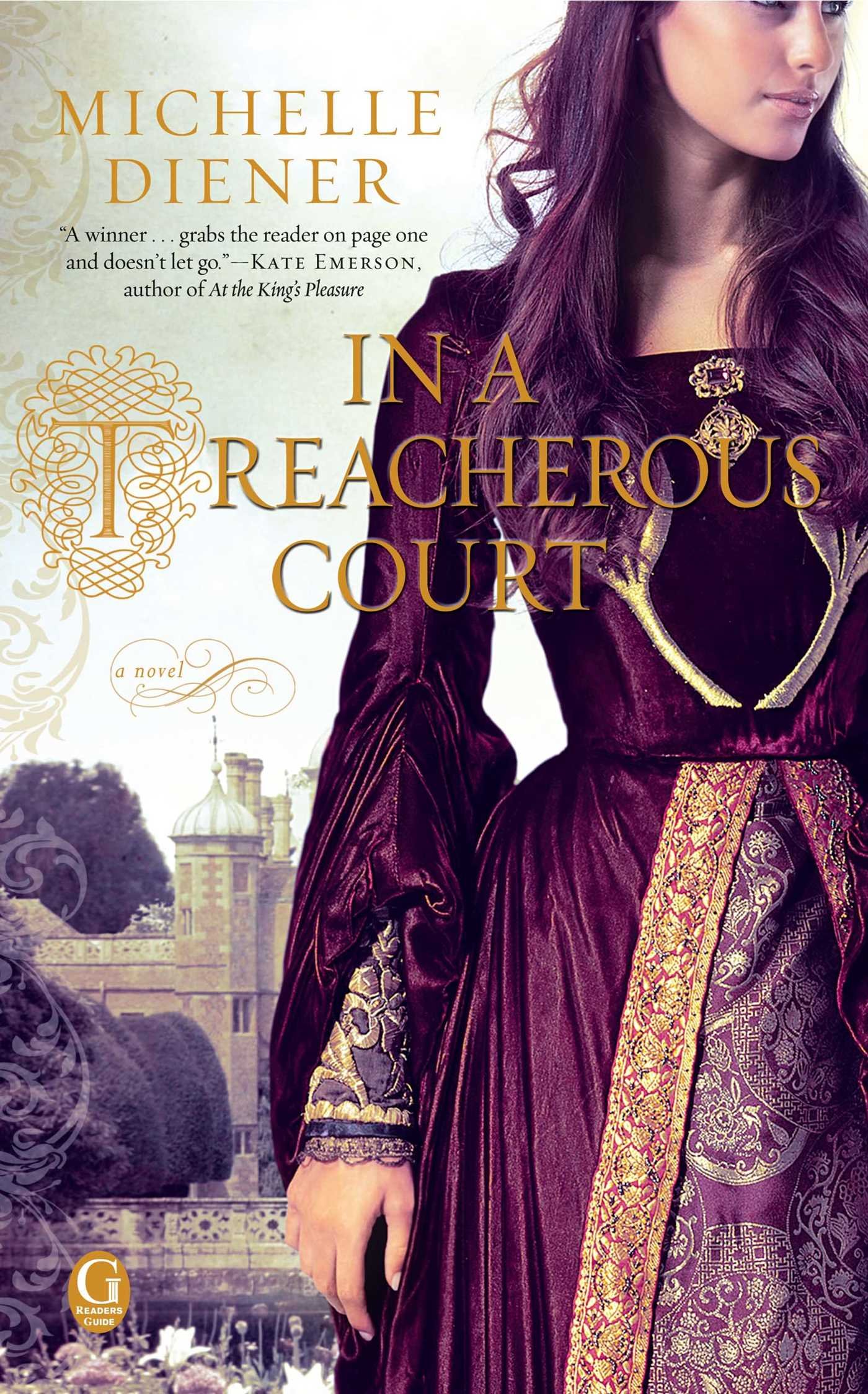
 Set in England in 1525
Set in England in 1525